Background and Rise of Malcolm X
Malcolm X, born Malcolm Little in 1925 in Omaha, Nebraska, was a key figure in the 1960s civil rights movement. His early years were marked by tragedy, with his father, a preacher who embraced Black nationalism, killed by supremacist groups. As a teen, Malcolm moved to Boston, eventually landing in prison for burglary at age 21. In prison, he discovered the teachings of Elijah Muhammad and the Nation of Islam, undergoing a personal transformation.
Upon release, Malcolm X quickly rose through the ranks of the Nation of Islam, captivating audiences in Harlem with his fiery speeches. He advocated for Black empowerment and self-defense, using the phrase "by any means necessary" to fight racial oppression. His approach differed from Martin Luther King Jr.'s peaceful protest strategy, creating a philosophical split in the civil rights movement.
Malcolm's relationship with the Nation of Islam soured after his controversial comment about JFK's assassination. This led to his suspension and departure from the organization. A pilgrimage to Mecca marked another turning point, as Malcolm adopted Sunni Islam and changed his name to El-Hajj Malik El-Shabazz. He began advocating for unity against racism, embracing a more inclusive approach.
Despite facing threats, Malcolm formed the Organization of Afro-American Unity, a secular movement pushing for greater recognition and rights for African Americans. Tragically, his life was cut short when he was assassinated at the Audubon Ballroom in 1965. Even in death, Malcolm's legacy as a transformative figure in the fight against racial injustice lives on.
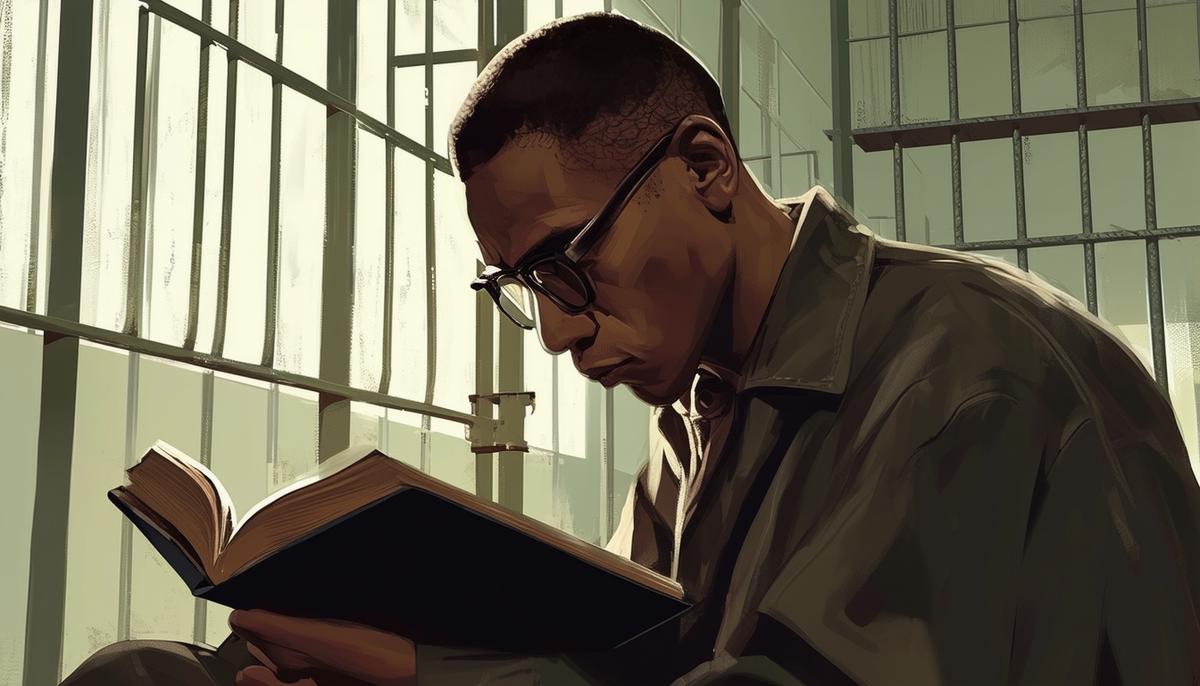
Tensions with the Nation of Islam
Malcolm X's relationship with the Nation of Islam was complex and ultimately contentious. As his vision for civil rights expanded, he grew impatient with the Nation's reluctance to engage more actively in the movement. Malcolm urged the organization to become a striking force in the battle for racial equality, a stance that clashed with Elijah Muhammad's more conservative approach.
The conflict intensified when personal scandals involving Muhammad surfaced, challenging his moral authority. Malcolm's outspoken nature and frequent clashes with Muhammad's non-confrontational stance widened the rift between them. The infamous remark following President Kennedy's assassination served as a catalyst for Malcolm's eventual exile from the Nation.
Malcolm's pilgrimage to Mecca marked a turning point in his ideology. He found inspiration in the racial unity he witnessed there, leading to a transformation in his approach to civil rights. This evolution culminated in the founding of the Organization of Afro-American Unity, which embodied his new vision of universal justice transcending racial divides.
The departure from the Nation of Islam was not without consequences. It ignited hostility and threats against Malcolm, painting him as both a visionary and an iconoclast. This tension between individual beliefs and organizational loyalty played out against the backdrop of the 1960s civil rights struggle, highlighting Malcolm X's role as a powerful catalyst for change.
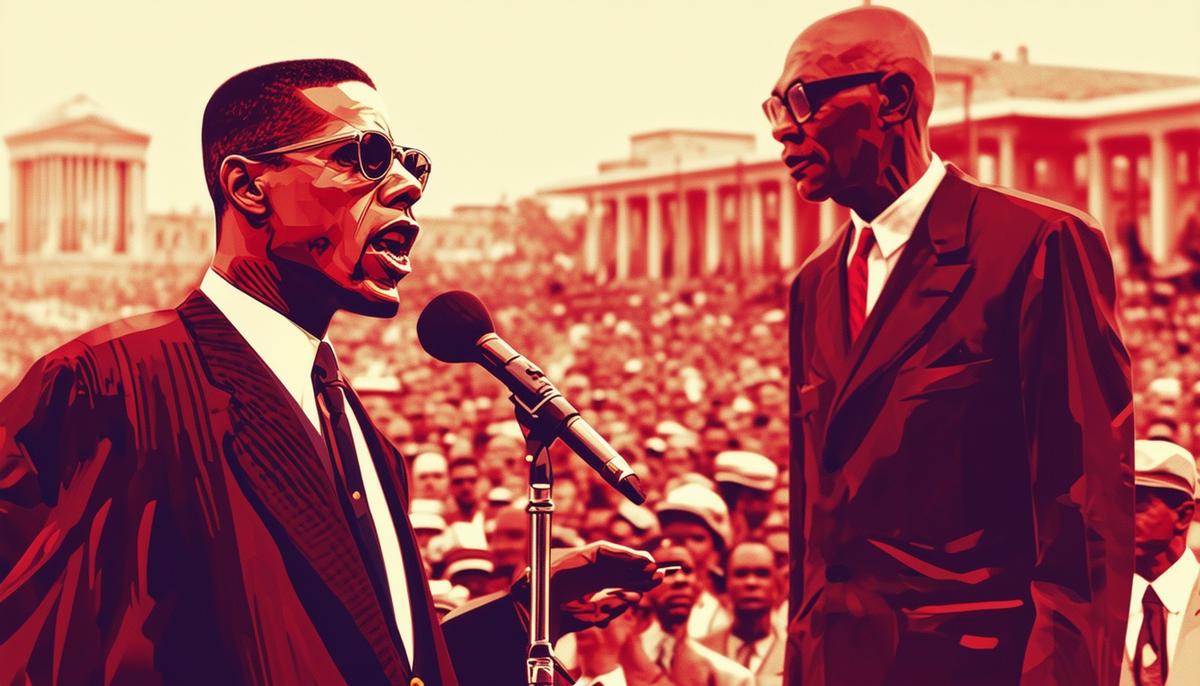
The Assassination Event
On February 21, 1965, Malcolm X was assassinated at the Audubon Ballroom in New York City. The event unfolded with shocking speed and violence. As Malcolm began his speech to a crowd of about 400 people, three assailants charged the stage, armed with a sawed-off shotgun and pistols. They unleashed a barrage of bullets, and Malcolm fell, his voice silenced.
The assassination happened in front of Malcolm's pregnant wife, Betty Shabazz, and their four young daughters. In the chaos that followed, one gunman, Mujahid Abdul Halim, was apprehended by a security guard and beaten by furious attendees. The other two attackers managed to escape in the ensuing panic.
Authorities quickly arrested Muhammad A. Aziz and Khalil Islam, both members of the Nation of Islam, and charged them with first-degree murder along with Halim. However, the case was plagued by inconsistencies and a lack of physical evidence from the start.
Decades later, new evidence emerged that cast doubt on the original convictions. In 2021, Aziz and Islam were exonerated, revealing a miscarriage of justice that had lasted for over half a century.
"I believe I was detained in this conspiracy by the NYPD and FBI in order to ensure Malcolm X's planned assassination would be successful."
Malcolm X's assassination marked a turning point in the civil rights movement of the 1960s. While it silenced a powerful voice for change, it also galvanized many to continue the fight for equality and justice that Malcolm had championed throughout his life.
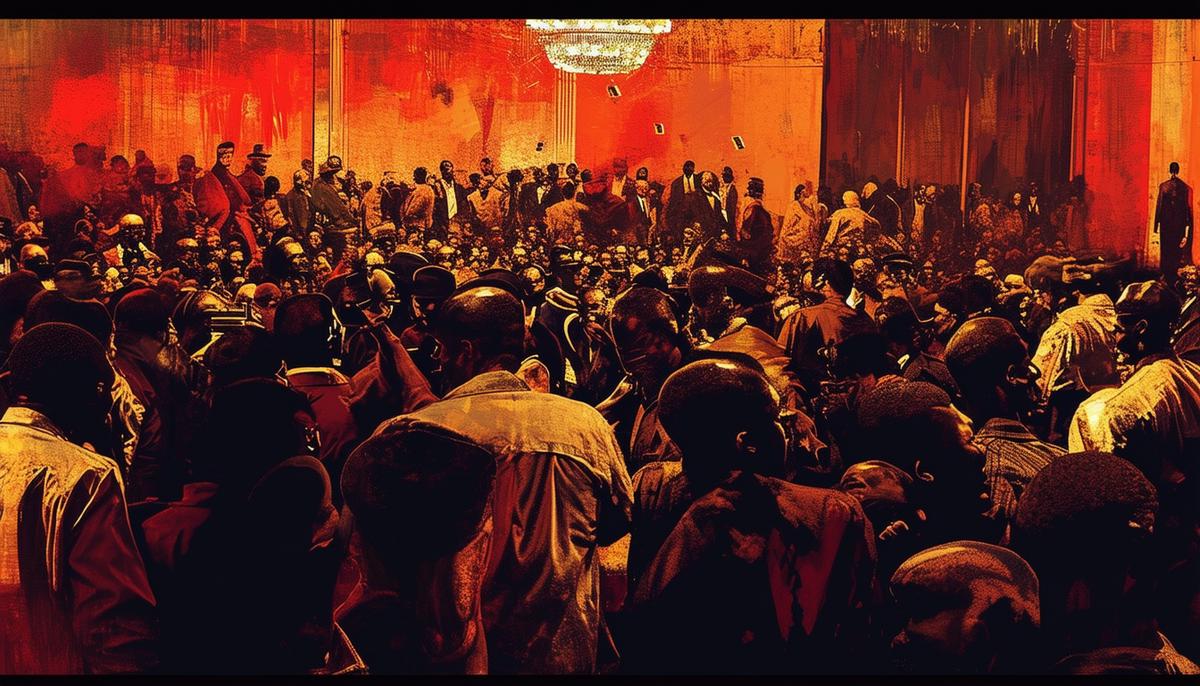
Trial and Convictions
The trial following Malcolm X's assassination was a complex and controversial affair. Three men were charged: Mujahid Abdul Halim, Muhammad A. Aziz, and Khalil Islam. Halim, captured at the scene, confessed to his involvement but insisted that Aziz and Islam were innocent.
The prosecution's case relied heavily on witness testimonies, which were often contradictory. Some placed Aziz and Islam at the scene, while others provided alibis for them. The lack of physical evidence was a glaring issue throughout the proceedings.
Despite the inconsistencies and Halim's testimony, the jury found all three men guilty on March 11, 1966. This verdict stood for decades, even as doubts and skepticism about the case persisted.
It wasn't until the 21st century that a reinvestigation, sparked by new evidence and scrutiny, led to a dramatic turn of events. In 2021, Aziz and Islam were exonerated, their innocence finally recognized after more than 50 years.
This reversal highlighted the flaws in the original trial and underscored the importance of continued efforts to seek justice, even long after the fact. The case of Malcolm X's assassination and its legal aftermath remains a powerful reminder of the complexities and challenges in the pursuit of truth and justice.
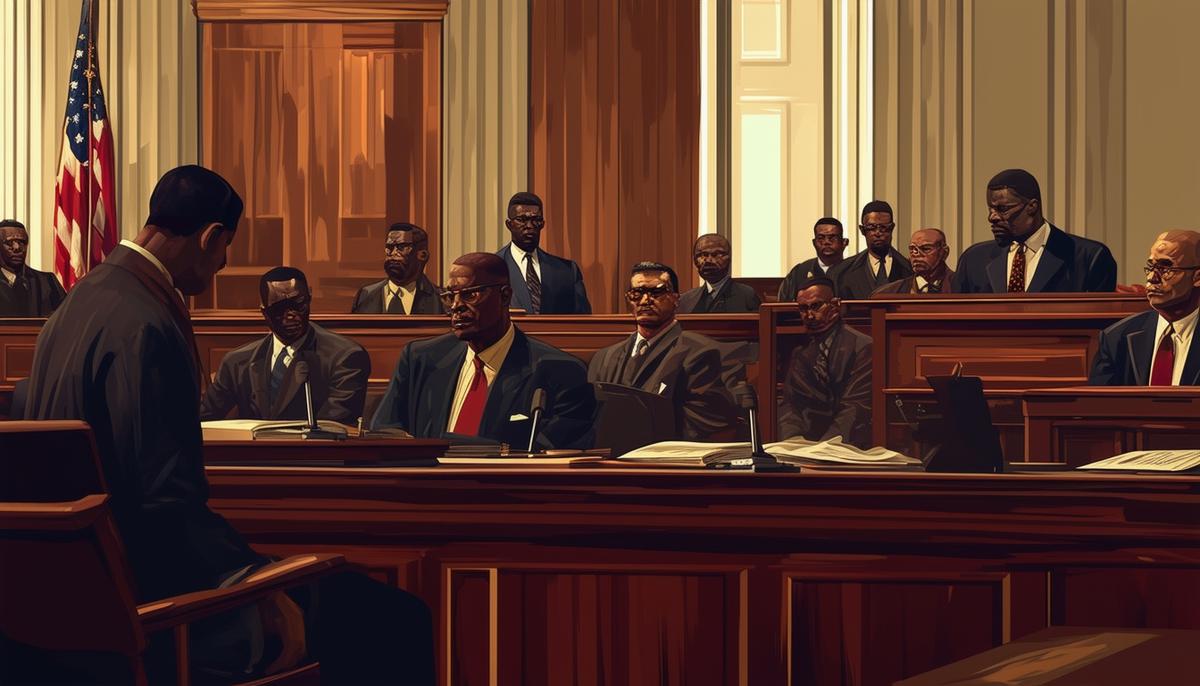
Reinvestigation and Exonerations
Fast forward a few decades, and the saga surrounding Malcolm X's assassination took on a new life. In February 2020, Manhattan District Attorney Cyrus R. Vance Jr. felt the need to reconsider the past, sparking a reinvestigation.
The documentary "Who Killed Malcolm X?" played a key role in illuminating new information. It cracked open boxes once locked by institutional oversight, serving up revelations to living rooms worldwide.
The reinvestigation unearthed critical evidence:
- FBI documents withheld during the original trial
- Significant information shaking up the prosecution's once unwavering story
- Withheld surveillance records
- Other lapses in the original investigation
On November 18, 2021, Muhammad A. Aziz and Khalil Islam were finally exonerated. Aziz, at 83, witnessed reality catch up with the accusations that had defined decades of his life.
This revelation doesn't only underscore the danger of withheld evidence—it shines a spotlight on the power of reconsidering past judgments. The saga transformed into a testament that seekers of truth must always return to the core of their mission, opting to revisit rather than resign.
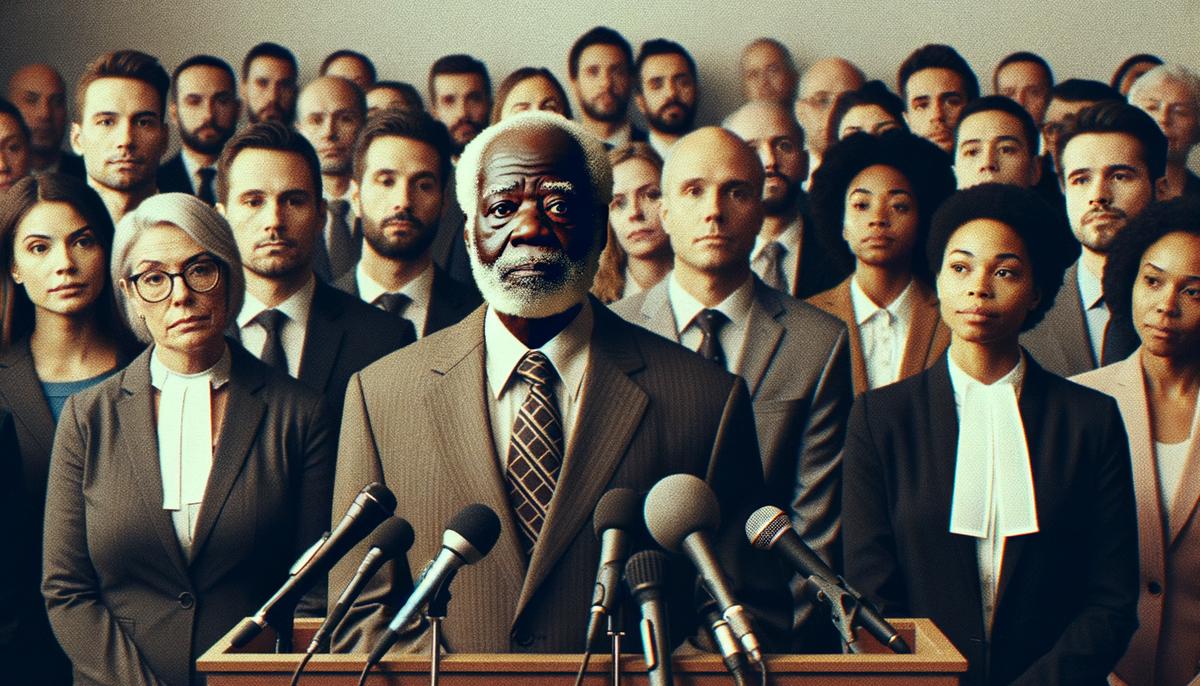
Ongoing Questions and Theories
In the ongoing drama of Malcolm X's assassination, questions linger about the true orchestrators behind his tragic end. Was it just the known players, or were there unseen actors from law enforcement or other secretive groups?
Two former members of Malcolm X's security detail have stepped forward, claiming they were deliberately sidelined to ensure the assassination went according to plan. Their revelations add another layer to the story of conspiracy and cover-up.
"I believe I was detained in this conspiracy by the NYPD and FBI in order to ensure Malcolm X's planned assassination would be successful," said Khaleel Sultarn Sayyed, one of the security team members.
Civil rights attorney Ben Crump continues to demand clarity, calling for the release of hidden documents and reports. His voice acts as a call for transparency in the pursuit of justice.
Speculations about undercover roles played by the FBI and other agencies continue to surface. The resistance to unveiling the full truth leaves onlookers pondering why damning documents related to Malcolm's surveillance remain tucked away.
No comment yet comes from the NYPD or FBI—a silence that speaks volumes. Theories abound, speculating about unseen hands and historical wrongdoing.
The mission to uncover hidden roles dances on. Perhaps the final piece of vindication still lies waiting in ongoing inquiries—a slow-burning tune that recalls not just injustice lived but the ceaseless hope beating through the decades.
Malcolm X's journey, marked by transformation and resilience, stands as a testament to the enduring power of reinvention and the relentless pursuit of justice. His life, though tragically cut short, continues to inspire and illuminate the path toward equality and understanding.
